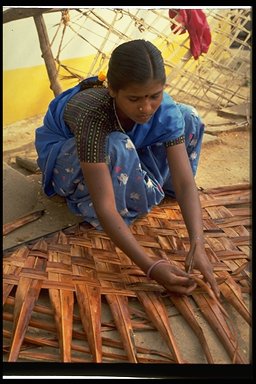 Over the last two decades, women in rural India have found “safety in numbers” through group workshops and finance education that have given them economic safety. In a political and social atmosphere typically adverse to women’s equality, Tamil Nadu Women’s Development Project has worked with groups of Indian women to help them gain confidence and equal economic opportunities through micro-loans.
Over the last two decades, women in rural India have found “safety in numbers” through group workshops and finance education that have given them economic safety. In a political and social atmosphere typically adverse to women’s equality, Tamil Nadu Women’s Development Project has worked with groups of Indian women to help them gain confidence and equal economic opportunities through micro-loans.
As in many developing countries, women play a hugely important role in India’s economy, especially in poorer areas. Although social pressures can make it impossible for women to become financially independent, rural women are the sole providers in 20-25 percent of households.
In 1987, the Indian Government made an effort to address the faulty infrastructure that was preventing women from progressing. The national government, along with the state government of Tamil Nadu, contacted the International Fund for Agricultural Development (IFAD) to come up with an effective way to help rural women empower themselves.
In getting women to become more financially independent, the Women’s Development Project faced a large obstacle: the women were often extremely hesitant about entering financial commitments. Many women had never had the freedom to request loans on their own, and the few who had borrowed money had been subject to unfairly high interest rates. Even aside from hesitation regarding finances, many of the women had never been encouraged to take initiative in making their own choices.
To combat the women’s inexperience with the microloan programs, the Women’s Development Project worked together with 27 preexisting NGO’s to form counseling groups in individual rural communities. The NGO’s were largely responsive and helped form 4,602 groups that involved over 100,000 women across the state ofTamil Nadu. Not only did the group meetings help build cohesion amongst groups of women in the same communities, they also helped build trust and confidence that the women needed to empower themselves in the financial world.
For the first six to twelve months of the program, women learned about individual finance and implemented group lending programs within their own communities. They also learned about establishing savings as a safety-net that women could use in emergencies. After witnessing the success of their own group loans and gaining confidence in the system, women were assisted in requesting formal loans from official state banks.
With women in charge of directing borrowed money, over half went to sustainable agriculture and livestock programs and nearly a quarter to small-scale trading of crafts and food products, both of which are key industries for rural areas. Women have also begun to assert social influence by orchestrating and funding larger scale community projects as a part of their legacy.
This self-built empowerment of women in rural communities is an excellent example of a sustainable shift in infrastructure because these programs have both social and economic legitimacy. These groups have also become self-regenerating as long-time members train novices, and as collaboration among women becomes more frequent. As one woman states, “I am hopeful about the future, because I have my own income and I know that if I have a problem I can solve it with the group.”
Elena Davert is a research intern with the Nourishing the Planet Project.

Danielle Nierenberg, an expert on livestock and sustainability, currently serves as Project Director of State of World 2011 for the Worldwatch Institute, a Washington, DC-based environmental think tank. Her knowledge of factory farming and its global spread and sustainable agriculture has been cited widely in the New York Times Magazine, the International Herald Tribune, the Washington Post, and
other publications.
Danielle worked for two years as a Peace Corps volunteer in the Dominican Republic. She is currently traveling across Africa looking at innovations that are working to alleviate hunger and poverty and blogging everyday at Worldwatch Institute’s Nourishing the Planet. She has a regular column with the Mail & Guardian, the Kansas City Star, and the Huffington Post and her writing was been featured in newspapers across Africa including the Cape Town Argus, the Zambia Daily Mail, Coast Week (Kenya), and other African publications. She holds an M.S. in agriculture, food, and environment from Tufts University and a B.A. in environmental policy from Monmouth College.








